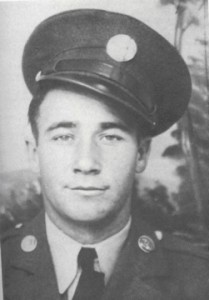
A Soldier’s Story
Memorial Day 2012
It was a call I’d dreamed of :
“Sir, I’m contacting you because of your research on Medal of Honor winner, Sgt. Leroy Johnson. My father was with him in Company K on December 15, 1944. In fact, he saved my father’s life with his brave act . . . and my father is still alive.”
WW II veteran Herman Clemenson (now age 91) shown with fellow veterans, his son James (right) and grandson (Erik) in Horace, ND. Families like this are the reason our country is strong.
Herman Clemenson lived a long full life due to the heroic act detailed in the story below.
Clemenson died two months ago. Read his Obituary and pay close attention to the dates. Herman Clemenson lived 24,550 days after Sgt. Leroy Johnson saved his life on Dec. 15, 1944. That’s 67 years, 2 months, and 17 days.
Before I relate more about this phone call, let me share about Leroy Johnson. I’ve been fascinated with his story since first seeing his bronze plaque in his hometown of Oakdale, Louisiana. The inscription on the plaque ends with the wonderful words of Jesus from John 15:13, Greater love has no one than this, that he lay down his life for his friends.
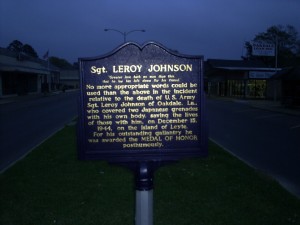
Leroy Johnson joined the army prior to Pearl Harbor. Like many young men during the depression, military offered a chance to escape the poverty of The Great Depression. He was placed in the 32nd Infantry Division, comprised mostly of National Guard soldiers from Wisconsin and Michigan.
With America’s entry into World War II, the 32nd division was shipped to New Guinea, a large island near Australia. Reading the official division history, it is learned that the fighting on this large island was difficult, slow, and deadly. The Japanese troops were experienced jungle fighters.
The 32nd Division, which would later spend more days in actual combat than any other division in the war, was green and untried.
During this campaign was when Leroy Johnson first showed his prowess as a soldier. He was awarded the Purple Heart as well as the Silver Star for gallantry. Sgt. Johnson spent part of the next year recuperating from wounds in Australia
The 32nd division, or Red Arrow Brigade as its men called it, were part of the 1944 invasion of the Philippines. The fighting with the Japanese on the many islands of this country was tough and deadly. Company K, in which Sergeant Leroy Johnson served, landed on the eastern Philippine island of Leyte and fought their way inland. It was near the city of Limon where Leroy Johnson performed the act of heroism for which he is remembered.
The following Army citation tells the story well:
Official Citation: Congressional Medal of Honor
On December 15, 1944 Sgt. Johnson was squad leader of a 9-man patrol sent to scout a ridge held by a well-entrenched enemy force. Seeing an enemy machine gun position, he ordered his men to remain behind while he crawled within six yards of the gun. One of the enemy crew jumped up and prepared to man the weapon.
Quickly withdrawing, Sgt. Johnson rejoined his patrol and reported the situation to his commanding officer. Ordered to destroy the gun, which covered the approaches to several other enemy positions, he chose three men, armed them with hand grenades, and led them to a point near the objective.
After taking partial cover behind a log, the men had knocked out the gun and began an assault when hostile troops on the flank hurled several grenades.
As he started for cover, Sgt. Johnson saw 2 unexploded grenades that had fallen near his men. Knowing that his comrades would be wounded or killed by the explosion, he deliberately threw himself on the grenades and received the full charge in his body.
Fatally wounded by the blast, he died soon afterwards. Through his outstanding gallantry in sacrificing his life for his comrades, Sgt. Johnson provided a shining example of the highest traditions of the U.S. Army.
The follow personal letter was written to Johnson’s parents by his commanding officer, a fellow Louisianan named Captain Johney Wax.
October 16, 1945
Dear Mr. and Mrs. Johnson,
Several times during the last few months I have received good news, but none made me any happier than when I picked up last Monday’s Times Picayune and learned that your son had been awarded the Congressional Medal of Honor.
He was a fine boy and every inch a soldier . . . I witnessed the incident for which he received our country’s highest award. After receiving his fatal wound, he managed to get up, take about three staggering steps and reach about three of us who were rushing up the hilltop to help him. We lowered him rapidly down the hill and he died within a few minutes.
Nothing can bring back his life but I am sincerely glad that a grateful nation could in some way, even though small, show their appreciation for what he did. His name and the sacrifice he made will always stand out in a Division that has been outstanding throughout this war.
Johney B. Wax, Captain Formerly C.O. Company K
Leroy Johnson was buried near Limon, Leyte, Philippines with full military honors. At a later date, his body was moved to the American Military Cemetery near Manila, the capital of the Philippines. He is buried in plot C-10-79 along with 17,206 other brave soldiers. Among this vast number of graves are the remains of six other Congressional Medal of Honor recipients.
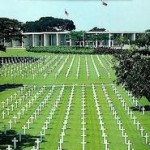
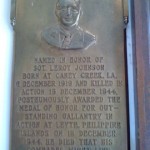
As I think about Leroy Johnson’s selfless act on that day over sixty-five years ago, two questions come to mind:
When did he decide to fall on the grenades? Was it an instinctive decision where everything happened quickly? Or was his act of laying down his life to protect his three fellow soldiers a decision—or commitment—he’d made days, weeks, or maybe months ago? Had there been a moment around a battlefield campfire when he had decided he would lay down his life for these men huddled around the fire?
Then my second question is maybe even more thought provoking: What causes a man to throw himself, knowing sudden certain death awaits, on a hand grenade? In Sgt. Johnson’s case, he outranked the three men with him on this patrol. Why was he, their leader, willing to die to save them?
My humble belief is that he did it because of love.
The plaque in Oakdale—the very words of Jesus, who also knew what self-sacrifice was, say it best:
“Greater love has no man than this- that he lay down his life for his friends.”
There is no better way to express it. Jesus’ words, as well as His actions, speak for themselves.
One of the reasons I’ve always been fascinated by the story of Leroy Johnson is how his act in the Philippines is a reminder of what Jesus did on the cross for us.
Once again the leader, the “ranking soldier” in this unit saw that quick and decisive action was required. Jesus did not appoint a lesser soldier to take action. He had been assigned this job by his commanding officer—His Father—who watched from a distance. He would finish this assignment—no matter what it took.
He freely, and willingly, took on the full brunt of the enemy’s device. No one made him do it. He did it on his own, freely sacrificing His life.
Memorial Day 2012 is a day to remember the sacrifice of men and women who were willing to die to buy the daily freedom we enjoy.
For every American, it should be a time of gratitude, thoughtfulness, and remembrance. Remembrance of a soldier’s story of ultimate sacrifice.

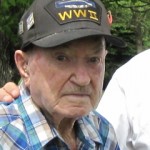
Postscript
Back to the phone call from Master Sergeant James Clemenson. He shared how his father, Herman Clemenson, still finds it hard sharing about the horrors of war in the Pacific.
He was with Leroy Johnson when he performed his heroic act. Later that day, Clemenson held his best friend as he died. The next day (Dec. 16) he received severe grenade wounds that ended his active service. See his obituary for more.
He had nearly seventy years extra of life due to the heroic act of a fellow soldier named Sergeant Leroy Johnson.
It’s a soldier’s story.
One that should be—and must be told.
Three generations of Clemenson veterans made possible by the gallant heroism of a Louisiana soldier, Leroy Johnson.
American Military Cemetery
Manila, Philipines
Final resting place of Sgt. Leroy Johnson
 Creekbank Stories Curt Iles, Storyteller
Creekbank Stories Curt Iles, Storyteller
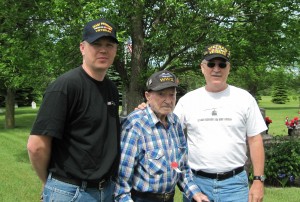

My Father, Staff Sergeant Donald C. Boyd, also served with the 32nd “Red Arrow” Division, 128th Infantry Regiment, Cannon Company. He fought on Leyte, Luzon, the Druiniumor River, and the Villa Verde Trail where he drove an M7 Priest, carried an M1 Garand, and was awarded the Bronze Star for heroism. He is currently recovering nicely at our home in Swanton, Ohio from triple bypass surgery in August, 2009. In September, 2011 we flew to Washington D.C. along with other WWII veterans courtesy of “Honor Flight of NW Ohio” to visit the WWII Memorial. A short interview and recent images of my remarkable Dad may be viewed at this link. http://carol_fus.tripod.com/army_hero_donald_boyd.html
Curt,
Thats a great story and a great way to end “Memorial Day”. I think of the guys I served with often and I am humbled by the ones that paid the ultimate price.
V/R
SAR
This is a story of my great Uncle Leroy. He still has 2 brothers and 2 sisters that are living. My grandpa was very proud of his brother. He passed away several years ago. We were raised hearing the stories about our Great Uncle Leroy Johnson who had died a hero. A picture of him and one of his plaque were on the wall of my grandparents home. My grandpa would have loved this story. My grandpa was such a kind hearted man also. I witnessed kind acts he did several times. I think it had alot to do with the way they were raised. I am so happy that my brother found this story. I enjoyed reading it and want to thank you for telling it. I will be sure and share it with my sons and our family.
Thank you,
Stacy
Sgt. Leroy Johnson was my grandmother’s brother.
Am doing research on your Great Uncle. He will be included with 41 other Civilian Conservation Corps Corps enrollees who later on became recipients of the MOH. Could you help me in any way, particularly about his early days. My E mail is cccfdr@comcast.net .My tele # is 412 793 3457 snail mail address is M. Schultz 316 Idlewood Rd Pgh Pa 15235